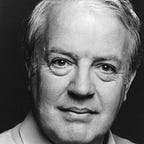The same only different
And here’s another story in the paper about twins! Last week’s feature about fifteen pairs starting primary school in Inverclyde had a picture of many of them — “not all” the caption informed us “are identical, making the task of telling them apart easier for their new teachers.” Peering at the display of youngsters I decided that children that age are perhaps identical to me anyway, allowing for colouring and a few pairs of specs.
If I understand this question, twins are either “identical” or “fraternal”, meaning either formed from the same egg or simply formed at the same time. I ploughed through the FAQs online in the hope of stating this correctly. What does not seem to be Frequently Asked is “Are ‘identical’ twins always identical — virtually indistinguishable?” Though the opposite question is there, and the answer is that fraternal twins stand the same chance of a strong resemblance as other siblings.
Naturally my mind goes to Shakespeare — and the “twins” in ‘Twelfth Night’, sister Viola and brother Sebastian. Well, the plot depends on them being like two peas in a pod (even to their clothes). And ‘The Comedy of Errors’ depends on the same thing twice over. But that’s literally another story. A different one, because it involves two sets of males.
Now everyone confidently calls Viola and Sebastian twins. Everyone except Shakespeare, it seems to me. Not for the only time, he gives out varying information. Sebastian says he and his sister were born in an hour. But much later in the play both siblings concur in referring to Viola’s thirteenth birthday as though it were exclusive to her. Well, birth takes time (I remember two …) and there must be twins with different birthdays, born near midnight.
Anyway, they are identical. Whether twins or not is (pedantically) irrelevant since “identical twins can only be of the same sex”. (I wonder how much Shakespeare knew or cared about this.)
Is this really possible? Funnily enough, I met a case. A girl I was working with brought her brother to a party, he was I believe a couple of years older. When you looked at him you thought “It’s Julie”. Then “No, it’s not, it’s her brother”. No wonder poor old Sir Andrew in ‘Twelfth Night’ gets so discombobulated when dealing with the two of them.
I have known actual twins. Brothers called the Saxtons joined us in the Sixth Form at school. They were certainly identical. Except … one of them had obligingly acquired a scar on his top lip for identification.
Much more recent was the local instance of Geoff Williams and his late brother Peter. I knew Geoff and if the brother in the street said “Hello, Roger” I could greet him by name. Peter didn’t know me, which likewise distinguished him. We passed in silence.
Then again — do “identicals” remain identical? I remember the boxer Henry Cooper had a twin brother, and noticing from pictures in their middle age that his hair was thinning slower than Henry’s had.
The least twin-like twins I have encountered were the Donaldsons, Peter and George, at the Junior School in Nicosia when I was a kid. I didn’t know at first that they were even brothers, Peter being big and brown-haired, George small and fair. They must have been fraternal twins. There is some irony in that I was required to ‘twin’ Peter myself. We played the same character in a nativity play. I was a Shepherd rushing home to proclaim the news of Jesus’s birth, and as I told the story of the Angels’ appearance it was acted out in front of us. There in the photos is Peter as ‘me on the hillside’ in a matching dressing gown, but with really no more than a ‘fraternal’ resemblance — we were both bigs boys with brown hair.
The Donaldsons and I were pals and we saw each other just a couple of times after my family moved from Nicosia, but never back in England. Unlike most of my friends from Cyprus they were not service kids, but ex-pats.
Peter and I both became actors, but because his name is such an ordinary one, it took me a long time to realise it was the same Peter Donaldson, even though we knew people in common. He went on to become an announcer, finally head announcer at BBC radio. And I was sad to hear that he had died, in 2015. We had never met as grown-ups.
And George? Puzzlingly, I never heard of him again, even though Peter had become reasonably well-known. Nothing online about Peter mentions a brother.
For someone with no siblings I seem to come across twins a lot. Our own son and daughter are nearer in age than we would consciously have planned. Unlike Julie and her brother, they couldn’t look more different.
